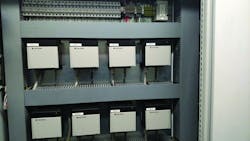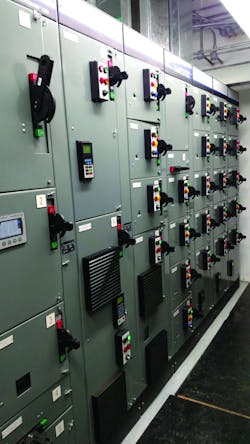Control, visibility & improved industrial security through process automation
Japanese chemical company Kao made its name in the late 19th century as Japan’s first domestic soap manufacturer. The company’s soap, Kao Sekken, cleaned up despite the dominance of import soaps and eventually established a foothold in the Japanese consumer marketplace.
The success of Kao’s soap helped fuel the launch of the company’s other personal and home-care products — including moisturizers, shampoos, oils and detergents. Today, Kao has expanded its reach far beyond Japan, with more than 33,000 global employees across its consolidated companies and more than $11 billion in annual net sales.
Among Kao’s global businesses is Quimikao, which was established near Guadalajara, Mexico, more than 35 years ago. Quimikao produces products for the North and South American, Asian and Australian markets. The company primarily produces cationic surfactant derivatives of fatty acids for use in a range of products that include fabric softeners, fragrance compounds, asphalt emulsifiers and corrosion inhibiters used in petroleum processes.
Quimikao recently decided to establish a new plant in Mexico to meet growing demand for nitrile, a chemical base for liquid detergents, fabric softeners and other products. Rather than designing the new facility from the ground up, Quimikao opted to replicate an existing Kao Japanese plant using locally sourced process automation controls and support services.
The system combines process and discrete control and provides redundant control of every phase of the nitrile production.
Challenge
The new Mexican plant required a distributed control system to operate the three primary chemical-processing areas used in nitrile
production:
- Reaction system
- Distillation system
- Complementary services, such as the supplying of fatty acids and steam generation
The facility included a Class I, Division 2 hazardous area and required secure access and visibility into all aspects of processing. The Japanese plant would serve as the basis for the Mexican plant, but an exact replication of the facility was not an option. The Japanese plant was built around a control system from a Japanese solution provider that had minimal experience or presence in Mexico. Mexico-based systems integrator ORDI was tasked with designing and installing the automation control system in the new facility within a six-month project timeline.
The system integrator met with an engineer of the original plant in Japan to discuss the system design that would be used for the new plant. They needed to decide the best approach for meeting the requirements of the original facility while keeping the project on schedule. They could not wait for equipment and component deliveries from Japan, and they wanted support services provided in the local language.
The system integrator decided to use a North-American-based equipment and solution provider that could help speed up the design, installation and commission processes in the new plant and provide an intuitive and flexible system. It would also help eliminate the communication challenges between the on-site integrators in Mexico and a Japanese support staff.
Solution
ORDI chose to implement a virtualized PlantPAx, a modern distributed control system (DCS) from Rockwell Automation. The system combined process and discrete control in one system and provided redundant control of every phase of the nitrile production.
The system delivered complete diagnostic monitoring to give operators visibility into all aspects of nitrile production. It also used intrinsically safe barriers to connect field devices to the module inputs and outputs to help meet Class I, Division 2 requirements for hazardous areas.
A virtual infrastructure, leveraging the VMware vSphere platform and the process automation system’s virtual image templates, was used for the benefits it offered when compared to a traditional physical infrastructure. Virtual machines, for example, have increased fault tolerance and are always available, which is critical for processes involving hazardous and explosive chemicals. They also provide improved disaster recovery, with virtual machine backups immediately available in the event that a physical computer stops working.
Because the system integrator and the DCS manufacturer both have a local presence in Mexico, the two entities were able to closely coordinate efforts throughout the project. The manufacturer validated the system integrator’s software architecture and EtherNet/IP network architecture designs and provided on-site support during development.
Results
Since implementing the virtual system, the new Quimikao facility has increased production efficiency and improved product quality and consistency compared to the first facility installed at Quimikao. The new nitrile facility produces 7,300 tons annually, compared with 4,000 tons annually produced originally.
The DCS enables operators to control all nitrile production processes from their workstations. It also provides an advanced monitoring and diagnostic system that allows operators to access and monitor several instrument readings from a central location. This has the potential to help increase preventive maintenance and reduce future repair costs.
The system integrator leveraged the manufacturer’s library of process objects to help keep the project on schedule and reduce any potential for human error during development.
The templates library was easy to use and helped minimize the testing and debugging time from weeks to days. Quimikao wanted a customized library for its specific application, and the system integrator team was able to easily and efficiently customize the manufacturer’s libraries to Quimikao’s specifications. The system’s virtual image templates also helped speed up development time. The templates provided core system elements as pre-configured, drop-in templates. The virtual image templates allowed for a significant decrease in the engineering time needed to install and set up the human machine interface applications.
Author’s note: The results mentioned in this case are specific to Quimikao’s use of Rockwell Automation products and services in conjunction with other products. Specific results may vary for other customers.
For more than 15 years, Alexis Jose Caraballo has been engaged with industrial process customers in Mexico, helping them solve process automation needs. He joined Rockwell Automation in 2013 and currently serves as the process sales lead for Mexico, supporting process control, safety and optimization projects in multiple industries.
Trademark information: PlantPAx® is a trademark of Rockwell Automation Inc. | EtherNet/IP™ is a trademark of ODVA Inc. | VMware vSphere® is a trademark of VMware Inc.

